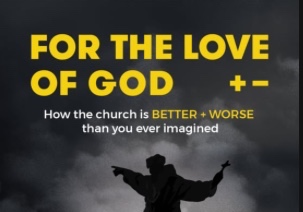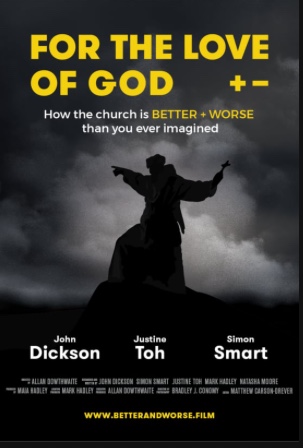
NILS VON KALM looks at Australia’s Centre for Public Christianity’s documentary, ‘For the Love of God: How the Church is Better and Worse Than You Ever Imagined’…
For the Love of God: How the Church is Better and Worse Than You Ever Imagined
In a Word: Honest

“This documentary pulls no punches. Like the Bible, it is honest in its portrayal of the church and its legacy. The producers of this film travelled the globe documenting how Christians played their part in some of the most tragic, beautiful and courageous acts in history.”
For 2,000 years, the Christian church has been at the forefront of some of the most transformative social movements in history. Lives have been changed and whole societies have been turned upside down. In that same 2,000 year history, there have occurred some of the most atrocious acts of inhumanity done in the name of God. How could this be?
This is the question that the new documentary, For the Love of God: How the Church is Better and Worse Than You Ever Imagined, explores. Produced by the Centre for Public Christianity, this film is the result of years of research by people such as John Dickson, Simon Smart and Justine Toh, among others.
This documentary pulls no punches. Like the Bible, it is honest in its portrayal of the church and its legacy. The producers of this film travelled the globe documenting how Christians played their part in some of the most tragic, beautiful and courageous acts in history.
Primarily looking at the history of the West, the legacy of the church is seen in its care for the poor in its first 300 years. Such was its impact that cultural attitudes were changed over time to the point that we no longer recognise them as unusual today. For example, the concept of humility was seen as weak and insipid in the first century. But, following Jesus’ example of service, and the scandal of the new Christian movement worshipping a figure who suffered the absolute humiliation of a Roman crucifixion, humility came to be seen as a virtue to the point that today we take for granted that it is a noble way to live our lives.
It is similar with the treatment of women and girls. It was quite normal in the first century for girls to be abandoned by their families simply because of their gender. However, following Jesus’ treatment of women, the early church took in abandoned girls and found this to be one of the ways in which the fledgling Christian movement grew.
The history of charity extends to the setting up of hospitals and medical care for the poor. Mother Teresa’s life is explored as an example of sacrificial service to the most vulnerable in society. Then there is the legacy of the American civil rights movement and the leadership of Martin Luther King, himself inspired by the love and nonviolence of Jesus.
A documentary like this cannot claim to cover all aspects of the legacy that the church has had, but it does a very good job of providing a balance between the good and the bad. Some of the bad it covers includes the shocking acquiescence of the church to the rise of Nazism in Germany in the 1930s, the terrors of the Crusades where Christians took up the sword in the name of Christ, and the Troubles in Northern Ireland, where young Catholic and Protestant children grew up being taught to hate their neighbours of different denominations.
In documenting the history of the church, the film emphasises Jesus’ great command to love our neighbour, and in particular, to love our enemies and do good to those who hate us. Using a musical analogy, the presenters state that Jesus wrote a beautiful composition, and that it is an open question about how consistently the church has played the melody that Jesus gave the world. What cannot be doubted though, as John Dickson says, is that Jesus’ ethic of love has given us much of what we value in the world today.
This is the message we are left with, that in the end we will all be known for how much we loved.
This documentary is timely in today’s climate, when many Christians are gripped by fear of the “other” and applaud the separating of children from families, while other Christians courageously stand up and attempt to reclaim the love of Jesus.
We have much to learn from watching this film, so that we don’t repeat the unloving legacy of our history, and so we can be inspired to repeat the Christlike legacy of it.
~ www.publicchristianity.org/documentary-screenings/
<p><a href=”https://vimeo.com/257438531″>For the Love of God</a> from <a href=”https://vimeo.com/publicchristianity”>CPX</a> on <a href=”https://vimeo.com”>Vimeo</a>.</p>





